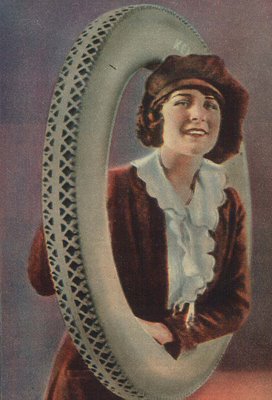
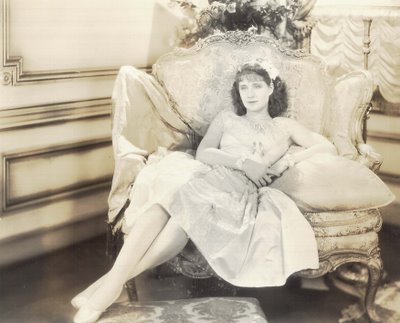
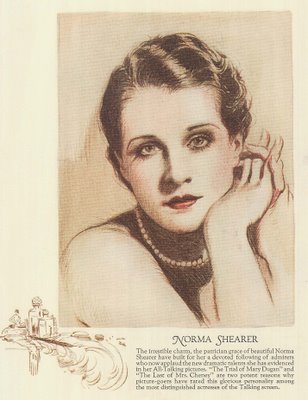
Glamour Starter --- Norma Shearer --- Part One
Ever bathe in a tub filled with ice water? Norma Shearer did. Often. This was but one of her defenses against encroachments of age. Others included midnight calisthenics, obsessive dieting, hours in front of a mirror before she’d walk her dog through the neighborhood, all this decades after stardom had faded and gone. Living a fairy tale life of Norma Shearer the movie star was great when her public cared, and indeed they did for a very long time, but eventually the party had to end, leaving everyone to go home, except Norma. In the end, she gave up her sanity for the sake of maintaining appearances, and died, I suspect, without realizing how great she really was.
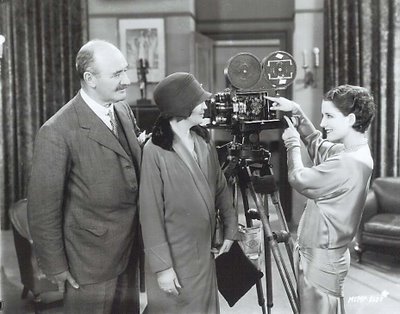
Most of us knew Norma Shearer only from the stills. Movie books published in the sixties and seventies would include tantalizing images from A Free Soul or The Divorcee, along with account of audiences gasping when Clark Gable "slapped" Norma in their first movie together, intervening years having transformed a shove into a slap for myth's recall. I never saw a Norma Shearer film until Turner began broadcasting them in the late 80's. They were syndicated prior to that, but we had no access to them in North Carolina. Why would local stations play an obscure relic from the early thirties when they could reach a bigger audience with another run of Tea House Of The August Moon or It Happened At The World’s Fair? Viewers preferred color on their TV sets by the mid-sixties, MGM field men better able to peddle newer feature packages than ancient "Pre-48 Greats." It came as surprise to many when Turner Classic Movies unveiled all of pre-code Shearers, as though sunken treasure were hauled up from depths, result a new old star born. Coffee table books celebrated Norma’s legendary portrait sittings with George Hurrell. Lines formed around blocks to see Let Us Be Gay at the Castro in San Francisco and The Divorcee at New York’s Film Forum. Rediscovery was too late to gratify Shearer. She had moved to the Motion Picture Country Home, final inning retreat for industry personnel that she supported during flush years. By then she had largely forgotten a time when Norma Shearer was "like a cork on a sea of wantonness."
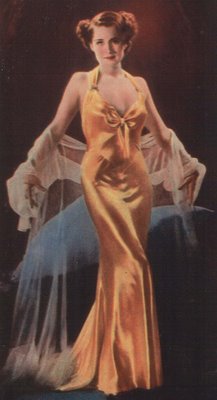

A strong mother and weak father, oft-recipe for more of Classic Era stars than I need recount here, but Norma’s differed only to extent that both her parents, plus a sister, coped with mental illness of one sort or other, this a specter that would haunt, then overtake, Norma as well. She began as a movie-struck kid in Montreal, on one occasion chasing Pearl White’s limousine during a personal appearance stopover the serial queen made. Shearer’s mother was a pushy sort and trained her girls to act in kind. The three of them, minus Mr. Shearer, bailed out of hearth and home, Dad getting a raw deal, but ambition must be served, him less than useful toward that goal. Mama Shearer and offspring made their way to New York, their cold-water flat like something out of The Godfather – Part 2. "She taught me how to take it on the chin" was Norma’s latter-day summing of Mom, rejection from Flo Ziegfeld and others proof that both were right. What were letters of introduction against cruel mention of chubby legs, a "lazy eye" (Norma's lifelong issue), and bad teeth? Producers like Ziegfeld were nothing if no tactless. Shearer soldiered on for what crumbs could be gathered. Extra work on Long Island put her before cameras, on one occasion for D.W. Griffith on Way Down East. Coming up a hard way only stiffened resolve, Shearer being evidence that climbers of her day had resolve we moderns lack.
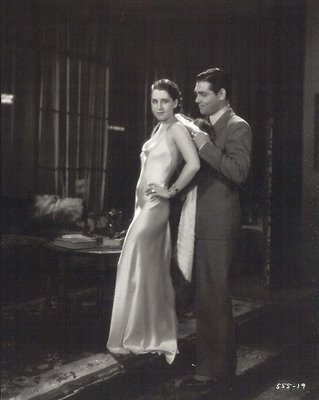
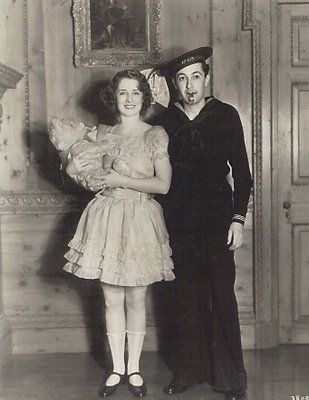
"Being a motion picture actress is the pitch of ecstasy," said up-and-coming Norma who would let no obstacle block destiny's way. Early if tentative success was at MGM, vehicles like 1927's The Demi-Bride barely suggesting a Shearer we’d come to embrace. Some of her silent features are lost ... you could argue this was for the best from surviving stills. She'd seem at first a standard issue leading lady, so-called chubby legs artfully concealed by the time Norma took greater control of her screen image. Triumph in talkers meant prominence in the sales annual, so Shearer got her own page, and mention of her first two with sound --- The Trial Of Mary Dugan and The Last Of Mrs. Cheney. That’s Broadway vet and made-for-the-talking screen Basil Rathbone sharing a roadster with Shearer’s Mrs. Cheyney --- this glorious antiquity shows up from time to time on TCM. Norma’s transformation to pre-code siren is more a topic for Part 2, but to sample, here she is with Clark Gable, the man who did not slap her, in A Free Soul. Finally, Shearer and husband Irving Thalberg are kitted in accordance with Marion Davies’ New Year’s Eve invitation, guests instructed to arrive in kids-wear. Old Hollywood was nothing if not weird at times, "baby parties" not uncommon during those years (see Joe E. Brown in opening scenes of Broadminded). A psychologist might explain what motivated movie stars and studio executives to party in rompers. It beats me. Anyone got a theory?
Part Two of Norma Shearer is HERE.
8 Comments:
Where was Norma's brother Douglas in all of this? Do you know when he went to Hollywood? Did he go with his sisters? He was MGM's sound genius.
"The pitch of ecstasy." There's a phrase to save for use in some future erudite conversation!
In regards to the Baby Parties, it is probably connected to the Baby Burlesque's that Hollywood was fond of at the time too.
Yesterday I've heard on British radio an interview with the legendary Baby Peggy (Margaret Montgomery) she's 88, very loquacious and immensely eloquent. She told extraordinary stories about being a professional child in Hollywood. I am sure she would be able to tell you why they were fascinated about "Baby Parties" in Hollywood. She would know more than anybody about it.
Hi Marco --- I'm planning to deal with Douglas Shearer in next week's Part Two on Norma. There's a lot of ground to cover with this actress, and a lot more good stills I'd like to post. Also, to Oscar --- thanks for the tip about Baby Peggy. You're right --- she is one who could fill us in on those "baby parties" --- in fact, she may be the last one surviving who could!
Johnny, Here's a good one. (in fact one of my "fav's" out of the "repertoire"): I couldn't have been much-more than 4-5 years old, when my mother took me one afternoon, to her dress-maker on Rodeo Dr., in B.H. There was an enormous toy-store up the street, called "Toy Menagerie". I guess I told her I was going to "hang-out" there for awhile, and she allowed me to go on my own. When she comes looking-for me, no "R.J."! She and my father start to panic! They look all-over, no sign of little "R.J." -- when according to Dad, here I come up the street,hand-in-hand, being escorted by a well-dressed Beverly Hills matron. "Your little-boy seemed lost", She says. "He's so cute I wanted to take him home!" My mother was so relieved to find me, she didn't pay much-attention as to who was delivering-me, but my father recognized her instantly, and thanked her. In later-years,I would kid with him as to why in hell he didn't let "Mrs. Thalberg" take me home as she wanted to. "I would have sent you a check every week!" I would chortle! R.J.
Fantastic Norma story, R.J. Why couldn't I have had your childhood?
How much -- and understand, I'm not greedy! Rick.
Post a Comment
<< Home